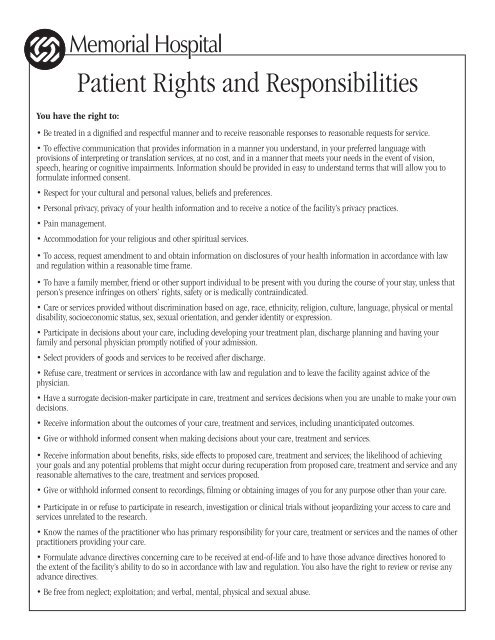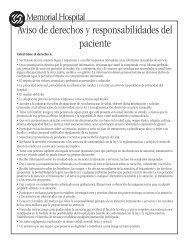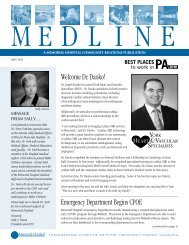Patient Bill of Rights (English) - Memorial Hospital
Patient Bill of Rights (English) - Memorial Hospital
Patient Bill of Rights (English) - Memorial Hospital
Create successful ePaper yourself
Turn your PDF publications into a flip-book with our unique Google optimized e-Paper software.
<strong>Patient</strong> <strong>Rights</strong> and Responsibilities<br />
You have the right to:<br />
• Be treated in a dignified and respectful manner and to receive reasonable responses to reasonable requests for service.<br />
• To effective communication that provides information in a manner you understand, in your preferred language with<br />
provisions <strong>of</strong> interpreting or translation services, at no cost, and in a manner that meets your needs in the event <strong>of</strong> vision,<br />
speech, hearing or cognitive impairments. Information should be provided in easy to understand terms that will allow you to<br />
formulate informed consent.<br />
• Respect for your cultural and personal values, beliefs and preferences.<br />
• Personal privacy, privacy <strong>of</strong> your health information and to receive a notice <strong>of</strong> the facility’s privacy practices.<br />
• Pain management.<br />
• Accommodation for your religious and other spiritual services.<br />
• To access, request amendment to and obtain information on disclosures <strong>of</strong> your health information in accordance with law<br />
and regulation within a reasonable time frame.<br />
• To have a family member, friend or other support individual to be present with you during the course <strong>of</strong> your stay, unless that<br />
person’s presence infringes on others’ rights, safety or is medically contraindicated.<br />
• Care or services provided without discrimination based on age, race, ethnicity, religion, culture, language, physical or mental<br />
disability, socioeconomic status, sex, sexual orientation, and gender identity or expression.<br />
• Participate in decisions about your care, including developing your treatment plan, discharge planning and having your<br />
family and personal physician promptly notified <strong>of</strong> your admission.<br />
• Select providers <strong>of</strong> goods and services to be received after discharge.<br />
• Refuse care, treatment or services in accordance with law and regulation and to leave the facility against advice <strong>of</strong> the<br />
physician.<br />
• Have a surrogate decision-maker participate in care, treatment and services decisions when you are unable to make your own<br />
decisions.<br />
• Receive information about the outcomes <strong>of</strong> your care, treatment and services, including unanticipated outcomes.<br />
• Give or withhold informed consent when making decisions about your care, treatment and services.<br />
• Receive information about benefits, risks, side effects to proposed care, treatment and services; the likelihood <strong>of</strong> achieving<br />
your goals and any potential problems that might occur during recuperation from proposed care, treatment and service and any<br />
reasonable alternatives to the care, treatment and services proposed.<br />
• Give or withhold informed consent to recordings, filming or obtaining images <strong>of</strong> you for any purpose other than your care.<br />
• Participate in or refuse to participate in research, investigation or clinical trials without jeopardizing your access to care and<br />
services unrelated to the research.<br />
• Know the names <strong>of</strong> the practitioner who has primary responsibility for your care, treatment or services and the names <strong>of</strong> other<br />
practitioners providing your care.<br />
• Formulate advance directives concerning care to be received at end-<strong>of</strong>-life and to have those advance directives honored to<br />
the extent <strong>of</strong> the facility’s ability to do so in accordance with law and regulation. You also have the right to review or revise any<br />
advance directives.<br />
• Be free from neglect; exploitation; and verbal, mental, physical and sexual abuse.
• An environment that is safe, preserves dignity and contributes to a positive self-image.<br />
• Be free from any forms <strong>of</strong> restraint or seclusion used as a means <strong>of</strong> convenience, discipline, coercion or retaliation; and to<br />
have the least restrictive method <strong>of</strong> restraint or seclusion used only when necessary to ensure patient safety.<br />
• Access protective and advocacy services and to receive a list <strong>of</strong> such groups upon your request.<br />
• Receive the visitors whom you designate, including but not limited to a spouse, a domestic partner (including same-sex<br />
domestic partner), another family member, or a friend. You may deny or withdraw your consent to receive any visitor at any<br />
time. To the extent this facility places limitations or restrictions on visitation; you have the right to set any preference <strong>of</strong> order or<br />
priority for your visitors to satisfy those limitations or restrictions.<br />
• Examine and receive an explanation <strong>of</strong> the bill for services, regardless <strong>of</strong> the source <strong>of</strong> payment.<br />
You have the responsibility to:<br />
• Provide accurate and complete information concerning your present medical condition, past illnesses or hospitalization and<br />
any other matters concerning your health.<br />
• Tell your caregivers if you do not completely understand your plan <strong>of</strong> care.<br />
• Follow the caregivers’ instructions.<br />
• Follow all medical center policies and procedures while being considerate <strong>of</strong> the rights <strong>of</strong> other patients, medical center<br />
employees and medical center properties.<br />
You also have the right to:<br />
Lodge a concern with the state, whether you have used the hospital’s grievance process or not. If you have concerns regarding<br />
the quality <strong>of</strong> your care, coverage decisions or want to appeal a premature discharge, contact the State Quality lmprovement<br />
Organization (QIO).<br />
Quality lmprovement Organization<br />
Phone: (866) 815-5440 • TTY: (866) 868-2289<br />
Fax: For Appeals: (855) 236-2423<br />
Fax: Other Reviews: (844) 420-6671<br />
If you have a Medicare complaint you may contact Acute and Ambulatory Care Services<br />
Phone: (800) 254-5164<br />
Mail: Acute and Ambulatory Care Services<br />
Pennsylvania Department <strong>of</strong> Health<br />
Room 532 Health and Welfare Building<br />
625 Forster Street<br />
Harrisburg, PA 17120<br />
Regarding problem resolution, you have the right to:<br />
Express your concerns about patient care and safety to facility personnel and/or management without being subject to coercion,<br />
discrimination, reprisal or unreasonable interruption <strong>of</strong> care; and to be informed <strong>of</strong> the resolution process for your concerns. If<br />
your concerns and questions cannot be resolved at this level, contact the accrediting agency indicated below:<br />
Healthcare Facilities Accreditation Program (AOA)<br />
Phone: (312) 202-8258<br />
Fax: (312) 202-8298<br />
Online: http://www.hfap.org/pdf/complaint_form.pdf<br />
Mail: Livanta<br />
BFCC - QIO Program<br />
9090 Junction Drive, Suite 10<br />
Annapolis Junction, MD 20701<br />
Mail: HFAP Complaint Department<br />
142 E Ontario Street<br />
Chicago, IL 60611<br />
ADM-1901GAOACERHMS-PA<br />
04/11 (Rev. 08/12, 07/13, 03/14, 07/14)
















